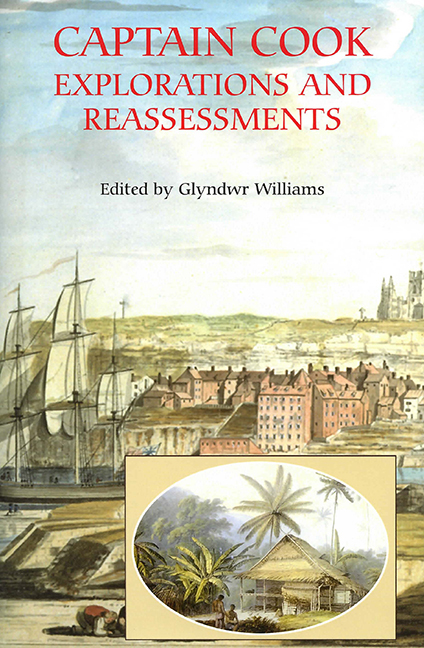Book contents
- Frontmatter
- Contents
- List of illustrations
- Contributors
- Acknowledgements
- Abbreviations
- Introduction
- Part I The Years in England
- Part II The Pacific Voyages
- Part III Captain Cook and his Contemporaries
- 8 A comparison of the charts produced during the Pacific voyages of Louis-Antoine de Bougainville and James Cook
- 9 Successors and rivals to Cook: the French and the Spaniards
- 10 Russian responses to the voyages of Captain Cook
- Part IV The Legacy of Captain Cook
- Index
10 - Russian responses to the voyages of Captain Cook
from Part III - Captain Cook and his Contemporaries
Published online by Cambridge University Press: 25 October 2017
- Frontmatter
- Contents
- List of illustrations
- Contributors
- Acknowledgements
- Abbreviations
- Introduction
- Part I The Years in England
- Part II The Pacific Voyages
- Part III Captain Cook and his Contemporaries
- 8 A comparison of the charts produced during the Pacific voyages of Louis-Antoine de Bougainville and James Cook
- 9 Successors and rivals to Cook: the French and the Spaniards
- 10 Russian responses to the voyages of Captain Cook
- Part IV The Legacy of Captain Cook
- Index
Summary
In 1790, the radical Russian social critic Alexander Radishchev published his Journey from St. Petersburg to Moscow. Amidst a harsh critique of political absolutism and serfdom which would earn him exile in Siberia, Radishchev attacked Russia's navy for its indifference towards voyages of discovery. The navy, he said, was an institution of apathy and petty careerism, where officers might advance themselves without ever leaving a harbour. Radishchev contrasted this dismal state to the inspirational voyages of Captain James Cook: ‘O Cook! Why did you pass your life in travail and privations? If you had boarded [Russian] ships you would have begun your voyage in delightful ease, and in delightful ease you would have ended it.’
Commentators on Russian reactions to the voyages of Cook, in particular Terence Armstrong in his appraisal of ‘Cook's reputation in Russia’, have identified a more enthusiastic response to Cook than Radishchev's comments would suggest. Armstrong identified a steady growth in Cook's reputation in Russia following the conclusion of the third voyage and interactions between Cook and the Russians in the Aleutians and Kamchatka in 1778–9. Despite an initial caution at foreign incursions into what was perceived as Russian territory, the Russian government soon began its own voyages of exploration to the region, beginning with those led by Cook's former crew member Joseph Billings in 1785–93. Armstrong notes that in a series of subsequent Russian circumnavigatory voyages in the early decades of the nineteenth century, many were commanded by Russians trained in the British navy, whose British experience helped foster an enthusiasm for Cook. Examining these voyages, by captains such as Adam von Krusenstern, Otto von Kotzebue and Thaddeus von Bellingshausen, Armstrong was surprised by the extravagance of Russian praise for Cook, noting, ‘A stage was even reached at which no wrong could be imputed to Cook.’ He also remarks, ‘the oddity here is that the hero is not Russian’.
In this chapter, two issues relating to Cook's reputation in Russia raised by accounts such as Armstrong's are addressed. First, it is proposed that the growth of Cook's reputation in Russia was more uneven than has been suggested. The first part of the chapter examines the decade following Cook's final voyage, and argues that enthusiasm for Cook and voyages of discovery was restricted to scholarly circles, failing to penetrate to the court and government.
- Type
- Chapter
- Information
- Captain CookExplorations and Reassessments, pp. 179 - 198Publisher: Boydell & BrewerPrint publication year: 2004

